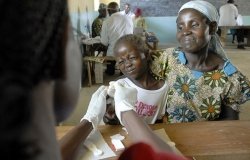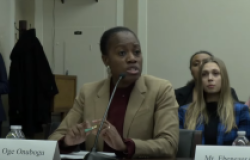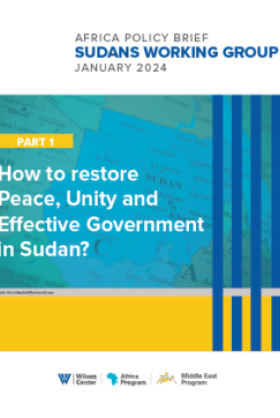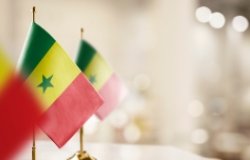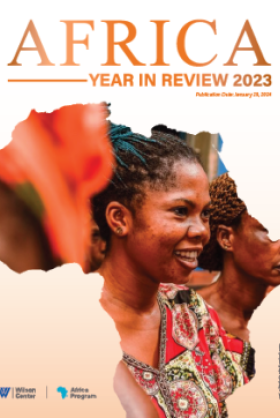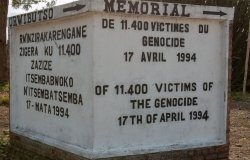A Kenyan View of Regional Conflicts
A discussion with Stephen Kalonzo Musyoka, Kenyan Member of Parliament and former Minister of Foreign Affairs on ongoing crises in Sudan and Somalia, moderated by Princeton Lyman, Ralph Bunche Senior Fellow for African Studies at the Council on Foreign Relations.
Overview
Stephen Kalonzo Musyoka, Kenyan Member of Parliament and former Minister of Foreign Affairs
Moderator: Princeton Lyman, Ralph Bunche Senior Fellow for Africa Policy Studies at the Council on Foreign Relations
For the past decade, East Africa has been beset by what former Kenyan Minister of Foreign Affairs Stephen Kalonzo Musyoka described as a "difficult humanitarian situation." Central to this have been the peace processes in Rwanda and Burundi, and the on-going conflicts in Sudan and Somalia. Mr. Musyoka provided a Kenyan perspective on these developments and the current conditions in East Africa. He also put forth his view on the future of the region and the role the African Union (AU), US and UN might have in shaping it.
Musyoka said that he felt the re-establishment of the East African Community (EAC) in 1999 had led to increased activity on its part in conflict resolution in the region. This renewed commitment to a more peaceful and unified East Africa can be attributed at least in part to a relaxation of the tensions as a result of the decreased political polarization in the post- Cold War era, polarization which led to the initial collapse of the EAC in 1977. The long-term stability of the EAC, however, will depend on the ability of the member states to maintain an even balance of power in the face of severe regional economic inequalities.
While political integration may be distant or even undesirable, the trajectory implied by the recent cooperation of East African states in resolving regional conflict is cause for optimism in terms of stability of the community. The historically conflicted states, Rwanda and Burundi, are expected to join the EAC within the next few years. Though fighting continues in the western provinces of Burundi, the conflict seems to be under control; Mr. Musyoka compared Rwanda's recovery from the 1994 genocide to the rebirth of the phoenix. The contribution of EAC countries to the success of the peace process in both Burundi and Rwanda indicates movement away from the pursuit of narrow national interests towards an emphasis on greater regional integration.
Yet the region remains troubled by open conflict in both Sudan and Somalia. In spite of recent criticism of the manner in which the Inter-Governmental Authority on Development (IGAD) intervened in the Sudanese crisis—specifically, IGAD's purported contribution to the escalation of hostilities in Darfur—Musyoka argued that the organization is emblematic of the capacity and willingness of African countries to take initiatives in resolving African based conflicts. Musyoka pointed to the prevention of killing on an even larger scale along Sudan's eastern border as evidence of IGAD's success in the region. Musyoka felt that the international community's pressure to rush the Abuja peace agreement had been one variable in promoting the continued violence, emphasizing the need to "build human contacts" between oppositional players to secure an enduring peace. Musyoka further stressed the need to uphold the principles laid forth in the Machakos protocol, particularly those establishing the unity of Sudan as a top priority and the right of South Sudan to self-determination. The next step will be to discuss power- and wealth-sharing protocols, though agreement on these issues will be difficult to achieve given the uneven distribution of resources throughout the country.
In Somalia, the situation on the ground continues to threaten long-term instability and violence if action is not taken to strengthen the transitional government. In the absence of a legitimate central authority with adequate institutional support, Somalia is a breeding ground for extremist organizations with military capacities and terrorist cells, in Musyoka'a opinion. The Transitional Federal Government (TFG), already weak and unable to enforce the rule of law, was further enfeebled by the recent military victory of the Union of Islamic Courts (UIC) in the Somali capital, Mogadishu. Musyoka criticized the TFG's earlier decision to move their seat of government out of the capital to Baidoa on the grounds that this move served to weaken the government's position with the Mogadishu-based warlords. Musyoka argued that in order to cope with the competing interests of the various armed factions, a strong message must be sent that "anyone trying to hold the peace process hostage will be treated seriously." There is a growing need to secure international aid to strengthen the transitional government in Somalia, but Musyoka warned that the volatility and complexity of the situation demand that plans for support be very carefully thought out to take into account the nuanced and complicated relationships between the various groups.
Although Musyoka described Kenya as an "island of peace" in the troubled region of East Africa, the country has not been without its share of difficulties as a result of wars in the bordering countries and the difficulties of in managing hundreds of kilometers of unpatrolled borders. Over the past few years, Kenya has been flooded with refugees, many of whom bring stores of small arms into the country. The circulation and concentration of small arms is therefore a growing problem for Kenya and one which will force the government to think seriously about possible ways of improving security on the borders. With 56% of its population already below the poverty line, Kenya is feeling the economic strain of this massive immigration. The stimulation of cross-border investment will be crucial to any viable solution to this economic dimension of the immigration challenge.
During the question and answer period, Musyoka addressed the problems of increasing corruption and "warlordship" in many African states, stating the need for the AU to take a firm stance in order to make it clear that countries "should not be able to plead sovereignty when carrying out terrible acts at home." When asked about the effectiveness of the principles contained in the constitutive act of the AU, Musyoka pointed to the formation of the New Partnership for Africa's Development (NEPAD) as an example of a positive initiative taken by senior African leaders that has the potential, through its ability to subject participating countries to open examination, to help bring about self-enforcement of the democratic principles upheld by the AU.
On the subject of international aid, Musyoka argued in favor of serious international intervention, particularly by the UN and the US. In particular, he emphasized the responsibility of the UN Security Council to intervene in Khartoum and the need for more focused and deliberate US support of the TFG in Somalia. Musyoka advocated a new approach to diplomacy in Khartoum—one that looks at conflict in terms of "people-to-people combat" and moves beyond conventional diplomatic practices to achieve more personalized solutions. Musyoka expressed the hope that the next AU summit meeting might witness a change in President Bashir's attitude towards a UN mission in Khartoum, but gave no indication of whether such a change can realistically be expected. Regarding the TFG in Somalia, Musyoka reiterated his point that the transitional government needs support to develop adequate institutions. When asked how the transitional government can better assert itself with the UIC in the capital, Musyoka noted an absence of unanimity on how to approach this issue within the UIC and suggested this internal weakness be exploited. He also cautioned against ignoring the alliance, urging instead a willingness to engage the UIC positively in the process of conflict resolution.
Hosted By

Africa Program
The Africa Program works to address the most critical issues facing Africa and US-Africa relations, build mutually beneficial US-Africa relations, and enhance knowledge and understanding about Africa in the United States. The Program achieves its mission through in-depth research and analyses, public discussion, working groups, and briefings that bring together policymakers, practitioners, and subject matter experts to analyze and offer practical options for tackling key challenges in Africa and in US-Africa relations. Read more
Thank you for your interest in this event. Please send any feedback or questions to our Events staff.




